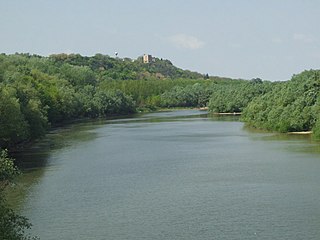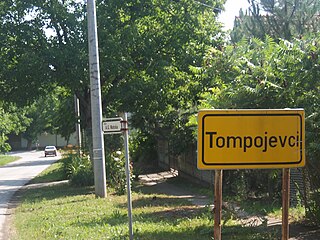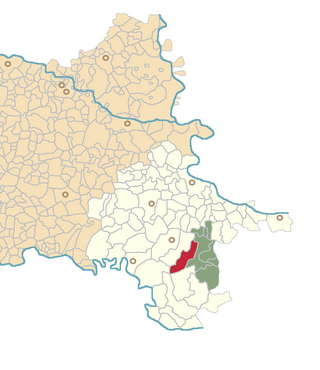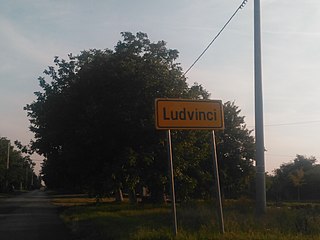
Demographic features of the population of the Czech Republic include population density, ethnicity, education level, health of the populace, economic status, and religious affiliations.

Daruvar is a spa town and municipality in Slavonia, northeastern Croatia, with a population of 8,567. The area including the surrounding villages has a population of 11,633 as of 2011.

Vrbovsko is a town in western Croatia, situated at the far east of the mountainous region of Gorski Kotar in the Primorje-Gorski Kotar County; on its 280 square kilometers area, Vrbovsko features 60 settlements and a total of 6,047 inhabitants. The town of Vrbovsko itself has a population of 1,673.

Borovo, also known as Borovo Selo, is a village and a municipality in Vukovar-Syrmia County in eastern part of Croatia. Situated on the banks of the Danube river, it shares its border with Serbia and the municipality of Bač on the opposite side. The historical development of Borovo is intricately linked with the Danube, which has played a pivotal role in its development as a notable industrial hub in the region.

Erdut is a village and a municipality in eastern Croatia some 37 km east of the major city of Osijek. Lying on the border with neighbouring Serbia, it was the site of the signing of the 1995 Erdut Agreement, which initiated the UNTAES transitional administration over the Eastern Slavonia, Baranja and Western Syrmia.

Bale is a settlement and municipality in Istria County, Croatia.

Brtonigla is a village and a municipality in the north-western part of Istria County, Croatia. Brtonigla is officially bilingual, with Croatian and Italian being equal; in 2011, 40% of the population declared themselves as ethnic Italians.

Šodolovci is a village and a municipality in Osijek-Baranja County in eastern Croatia. In the seven villages of the Šodolovci Municipality, there were 1,653 inhabitants at the time of the 2011 Census.

Končanica is a town and a municipality in Slavonia, in the Bjelovar-Bilogora County of Croatia.

Tompojevci is a village and municipality in the Vukovar-Syrmia County in Croatia.

Grubišno Polje is a town in Bjelovar-Bilogora County, Croatia.

Dežanovac is a village and a municipality in Bjelovar-Bilogora County, Croatia.

Pačetin is a village in the municipality of Trpinja, Vukovar-Syrmia County in the easternmost part of Croatia. At the time of the 2011 Census the population of the village was 541. Village lies north of the Vuka River and west of the M601 railway. Its major landmark is the Church of St. Nicholas from the 18th century. County road Ž4111 passing through the villages of Pačetin, Bobota and Vera connect all three villages with D2 road and D55 road. Pačetin is 28.6 km southeast of Osijek, the economic and cultural centre of Slavonia and 17.2 km from the Osijek Airport. County seat Vukovar is 17.3 km east of Pačetin.

Bršadin is a village in the Trpinja Municipality in Croatian easternmost Vukovar-Syrmia County. Bršadin is located north of the Vuka river and west of the town of Vukovar on the main road to Vinkovci.

Donje Novo Selo is a village in the municipality of Nijemci in Vukovar-Syrmia County, Croatia. The population is 498. The etymology of the village comes from Slavic languages meaning new village, Novo Selo.

Bobota is a village in the Municipality of Trpinja in Vukovar-Syrmia County in eastern Croatia. Regional Bobota Canal, the first major water management project in modern-day Croatia in the post-Roman Empire period, was named after the village.

Vera is a village in Trpinja Municipality in eastern Croatia. The village is the northernmost settlement of the Vukovar-Syrmia County.
The Serbian language is one of the officially recognized minority languages in Croatia. It is primarily used by the Serbs of Croatia. The Croatian Constitution, Croatian Constitutional law on national minorities rights, Law on Education in Language and Script of National Minorities and Law on Use of Languages and Scripts of National Minorities define the public co-official usage of Serbian in Croatia. Serbian and Croatian are two standardized varieties of the pluricentric Serbo-Croatian language. The majority of Serbs of Croatia use Ijekavian pronunciation of Proto-Slavic vowel jat except in the Podunavlje region in Vukovar-Syrmia and Osijek-Baranja Counties where local Serb population use Ekavian pronunciation. Post-World War II and Croatian War of Independence settlers in Podunavlje which have come from Bosnia, Dalmatia or Western Slavonia either use their original Ijekavian pronunciation, adopted Ekavian pronunciation or both of them depending on context. In 2011 Census majority of Serbs of Croatia declared Croatian standardized variety as their first language with Ijekavian pronunciation always being required standard form in Croatian. While Serbian variety recognizes both pronunciations as standard, Ekavian is the more common one as it is the dominant one in Serbia, with Ijekavian being dominant in Bosnia-Herzegovina, Montenegro and Croatia.

Ludvinci is a village located in the municipality of Trpinja, Vukovar-Syrmia County, Croatia. The settlement was originally established as a pustara, a Pannonian type of hamlet.
Daruvarski Brestovac is a village in Croatia.


















